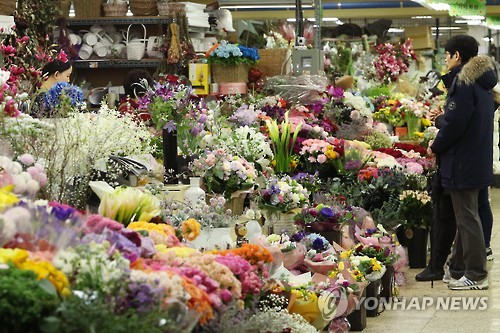- California Assembly OKs highest minimum wage in nation
- S. Korea unveils first graphic cigarette warnings
- US joins with South Korea, Japan in bid to deter North Korea
- LPGA golfer Chun In-gee finally back in action
- S. Korea won’t be top seed in final World Cup qualification round
- US men’s soccer misses 2nd straight Olympics
- US back on track in qualifying with 4-0 win over Guatemala
- High-intensity workout injuries spawn cottage industry
- CDC expands range of Zika mosquitoes into parts of Northeast
- Who knew? ‘The Walking Dead’ is helping families connect
Consumer sentiment weakens amid economic slowdown, political uncertainty
SEOUL, Feb. 7 (Yonhap) — South Korea’s consumer sentiment has weakened amid a prolonged economic slowdown and political uncertainty, data showed Tuesday.
The index for output generated in the restaurant sector came to 107.1 in December, compared to 111.1 from a year earlier. The figure represents a fourth straight month of decline, according to data compiled by Statistics Korea.
Month-on-month decline began in June 2015 when South Korea was hit hard by the Middle East Respiratory Syndrome, a deadly respiratory disease that killed 38 people.
South Korea’s overall consumer sentiment also fell to the lowest point in nearly eight years in January. The composite consumer sentiment index for January came to 93.3, the lowest since March 2009 when it stood at 75, according to data from the Bank of Korea (BOK).
A reading above 100 means optimists outnumber pessimists.
An index measuring the people’s expected spending on dining out fell to 87 in January from 88 a month earlier. It is the lowest since April 2013 when the index was at 86. The development indicates that South Koreans are reluctant to spend money out of concern of a prolonged economic slowdown.
Analysts said South Korea’s anti-graft law has also had a negative impact on restaurant and flower businesses. In South Korea, potted orchids had long been used as a gift for those who are promoted in companies, but the practice was affected by the law.
Taking effect in September, the law imposes tight limits on free meals and gifts that can be accepted by government officials, journalists and private school teachers to try to curb the deep-rooted tradition of excessive hospitality. The maximum value of gifts a person subject to the law can receive has been set at 50,000 won (US$44), and cash gifts for events such as weddings and funerals have been fixed at no more than 100,000 won.












